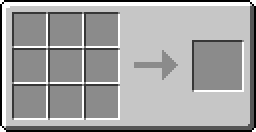Difference between revisions of "Monitor"
(the hell?) |
(→Using the Monitor) |
||
| Line 14: | Line 14: | ||
So, in this case, if you typed "hello" in the name of the program part, the monitor would display "Hello World!". | So, in this case, if you typed "hello" in the name of the program part, the monitor would display "Hello World!". | ||
| + | fdsf;';........................................?>/<./,df./sd,./fsd,./d,sd | ||
===Using the Monitor within the Lua interface=== | ===Using the Monitor within the Lua interface=== | ||
Revision as of 18:25, 8 October 2012
The Monitor is a block that can display text on its front side. When several screen blocks are placed on the same plane, it will form a single monitor. It is useful for displaying information at a server spawn, showing a program on the monitor, and even showing the status of a IC2 reactor! (provided you have CcSensors installed)
Recipe
Using the Monitor
The command used to control a monitor: monitor [top, bottom, left, right, front or back] [the name of the command to display]
So, in this case, if you typed "hello" in the name of the program part, the monitor would display "Hello World!". fdsf;';........................................?>/<./,df./sd,./fsd,./d,sd
Using the Monitor within the Lua interface
The monitor can be summoned through a command or through coding with the Lua command.
The command used to control a monitor within the Lua interface: shell.run("monitor" "[top, bottom, left, right, front or back]" "[the name of the command to display]")
For example, here is a way of summoning the monitor through a command:
print("Hello Monitor!")
